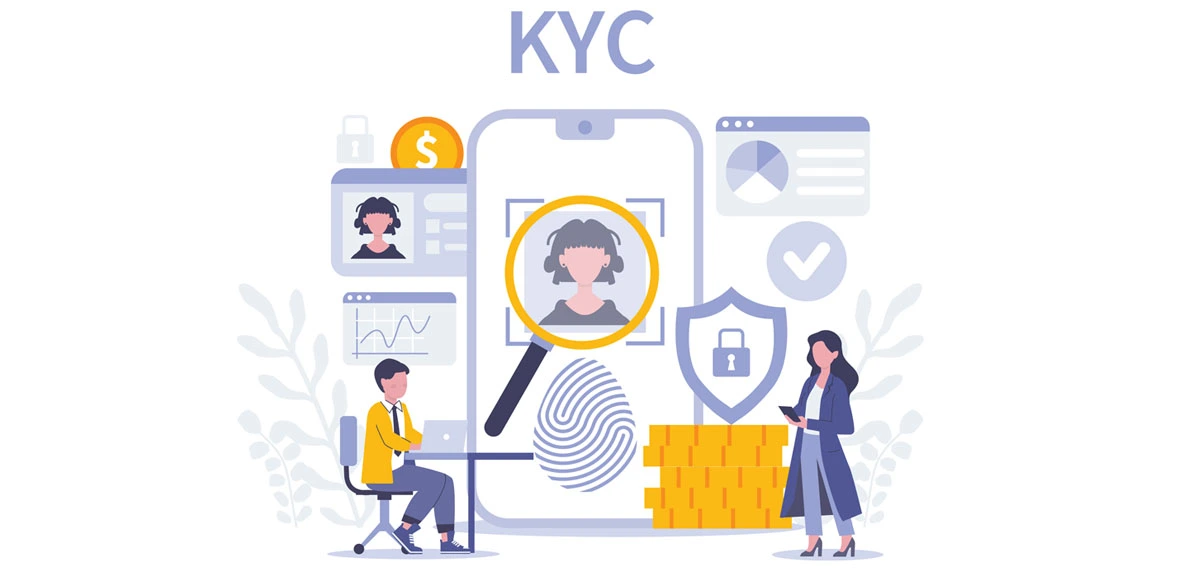KYC, or Know Your Customer, is a regulatory process ensuring financial security, compliance, and transparency. It is necessary for individuals and organisations availing of financial services such as banking, insurance, and investments. Ensuring that the KYC process is complete in all aspects, ensures that you do not face any unnecessary delays or complications in getting your requirements met.
But what is KYC? It is a process wherein the customer must share important documents with the help of which the bank/financial institution can verify their identity and residence. Knowing what the meaning of KYC is, and understanding how it works, can help you get clarity on how to ensure security in financial services.
Introduction to KYC
With the rise in digital transactions and financial fraud, KYC has become an indispensable part of customer onboarding. The process ensures service providers can verify the identity and address of customers before offering them services. From opening a bank account to purchasing life insurance, KYC is now mandatory across multiple sectors.
KYC - Full Form & Meaning
The full form of KYC is "Know Your Customer." It is a process by which financial institutions and service providers authenticate the identity and address of their customers.
But what is the meaning of KYC? KYC involves the submission of official documents establishing who you are and where you reside. These documents could include Aadhaar, PAN, passport, or utility bills. The purpose is to prevent identity theft, fraud, and illegal activities such as money laundering.
By verifying your identity and address through KYC, institutions can ensure they are dealing with legitimate customers.
What is eKYC?
Electronic Know Your Customer (eKYC) is a paperless method for completing the verification process. It leverages Aadhaar-based authentication and has gained popularity due to its efficiency.
Here are some of the key benefits of eKYC that customers can experience.
- Eliminates the need for physical paperwork.
- Speeds up the verification process.
- Enables remote access to financial services.
Through eKYC, financial service providers can authenticate customer details securely and seamlessly.
Why is KYC Important in Banking and Insurance?
KYC is essential for ensuring secure and legitimate financial transactions. Its importance spans multiple industries:
1. In Banking
- Fraud Prevention: KYC helps verify customers' identities, reducing the risk of fraudulent transactions.
- Compliance: KYC helps with adherence to legal frameworks such as the Prevention of Money Laundering Act (PMLA).
- Transparency: KYC ensures clarity in all financial dealings.
2. In Insurance
- Seamless Claims: Accurate KYC details ensure smooth claims processing in life insurance policies.
- Risk Assessment: KYC helps insurance providers evaluate risk before underwriting policies.
Advantages of KYC
Completing the KYC process in insurance and other domains can offer far-reaching benefits for both customers and financial institutions.
Stronger Protection Against Fraud
KYC reduces the chances of identity theft, impersonation, and misuse of financial accounts to a great extent. By verifying who the customer is, institutions can check for any suspicious activity much earlier This way, they can prevent fraud before it occurs. KYC is especially important in banking, insurance, and investment platforms, where sensitive information is shared.
Faster Access to Financial Services
With your KYC in place, processes such as opening bank accounts, purchasing life insurance or term insurance, and investing in mutual funds become much faster. Nowadays, many organisations allow you to carry out your KYC verification online. This makes onboarding almost instant.
Smoother Claims, Withdrawals & Transactions
In the insurance sector, having correct KYC details can ensure your claim is approved faster and without delays. In banking and investment plans, verified details help you complete high-value transactions without unnecessary checks.
Regulatory Compliance & Transparency
KYC keeps both customers and institutions in line with laws such as the Prevention of Money Laundering Act (PMLA). This ensures transparency and creates a safer financial ecosystem.
Overall, completing KYC in insurance and other domains can improve trust, increase the security aspect, and ensure a seamless experience across all financial services.
When is KYC Required?
Completing your KYC verification is mandatory for:
1. Opening bank accounts (savings, current, or fixed deposits).
2. Applying for loans.
3. Purchasing or renewing life insurance policies.
4. Investing in mutual funds, stocks, or fixed-income securities.
5. Making large-value financial transactions.
Types of KYC
There are several methods to complete KYC, each suited to different needs:
1. Aadhaar-based eKYC
- Utilises Aadhaar for digital verification.
- Requires customer consent for authentication.
2. Paper-Based KYC
- Customers submit physical copies of documents.
- Suitable for those without Aadhaar or digital access.
3. Digital KYC
- Fully online submission of scanned documents.
- Quick and efficient process.
4. Offline KYC (Physical Verification)
- Customers visit a branch for in-person verification.
- Documents are verified physically.
5. Video KYC
- Conducted over a video call.
- Customers display their documents and confirm their identity in real-time.
KYC in Banking
Banks use KYC to comply with regulations and secure customer data. Before opening an account, banks require customers to submit identity and address proofs.
- For Savings Accounts: Basic KYC ensures seamless account opening.
- For Loans: KYC helps validate customer credentials and creditworthiness.
- For Transactions: High-value or suspicious transactions are flagged if KYC norms are not met.
KYC for Investments and Insurance
KYC is mandatory for investments and insurance for transparency and compliance:
For Investments
KYC ensures that customers investing in mutual funds, stocks, or bonds are legitimate. It prevents fraud and streamlines account management.
Before you start exploring investment plans, proper KYC is essential to ensure smooth processing and regulatory approval.
For Life Insurance
KYC is vital for policy underwriting and claim settlement. Accurate KYC details reduce disputes during claims processing.
KYC Documentation: What Documents Are Required?
The list of documents required for KYC verification are categorised as follows:
Category
| Accepted Documents
|
Identity Proof
| Aadhaar Card, PAN Card, Passport, Voter ID
|
Address Proof
| Utility Bills, Rent Agreement, Passport
|
Age Proof
| Birth Certificate, Passport, Aadhaar Card
|
The KYC documents are official papers submitted for identity and address verification. These include Aadhaar, PAN, and other government-approved IDs.
How to Complete KYC in India
One can complete KYC verification online or offline, depending on their convenience.
Step 1. Online KYC (eKYC)
- Visit the official website or app of the service provider.
- Enter Aadhaar details for OTP-based verification.
- Upload scanned copies of required documents.
Step 2. Offline KYC
- Visit a branch or service centre.
- Submit photocopies of identity and address proofs.
- Complete the in-person verification process.
Step 3. Video KYC
- Schedule a video call with the provider.
- Display identity documents on the call.
- Confirm details with the representative.
Knowing what KYC is, what KYC stands for, and how it works, is important for financial security and compliance. Whether you are opening a bank account or purchasing life insurance plans, completing KYC ensures transparency and prevents fraud. Choose the method that best suits your needs—whether it’s eKYC, video KYC, or traditional paper-based verification.
By adhering to KYC norms, you can ensure secure access to services such as banking, investments, and life insurance plans. Proper documentation can make the process efficient and stress-free.
FAQs
What are the requirements for KYC?
You will be required to submit identity proof (e.g., Aadhaar, PAN) and address proof (e.g., utility bills, rent agreement).
How can I get KYC in India?
You can complete KYC verification online or offline. The online process could involve video verification or submission of the required documents through the portal. The offline process may require you to submit the necessary documents in person. The KYC process could differ slightly according to the rules and regulations of the organization.
What is KYC verification?
KYC verification is the process of validating a customer’s identity and address for financial and regulatory compliance.
How much time does it usually take to complete KYC?
The time required depends on the method you choose. Aadhaar-based eKYC and online KYC verification can be completed within minutes or a few hours maximum. Video KYC may take 5–10 minutes. However, the offline, in-person KYC process may take 1–3 working days because physical documents need to be verified.
Do all types of insurance policies require KYC?
Yes. KYC is compulsory for every major insurance product, including life insurance, term insurance, and investment-linked policies. It helps insurers verify customer details and ensures better policy servicing and claim settlements.
Can I change or update my KYC information later?
Yes, you can. If your address, name, phone number, or identification documents change, you can update your KYC at any time. Simply share the revised documents with the insurer through online or offline channels.
What happens if I do not finish my KYC process?
If KYC is not completed, financial services may be delayed or denied. For insurance customers, incomplete KYC may cause issues when buying and receiving the policy documents. It can also delay or complicate claim processing.
Is online KYC allowed for insurance customers?
Yes. Most insurers now offer KYC verification online, including eKYC and video KYC options when you buy life insurance plans. These methods can make verification faster, convenient, and easy to complete from anywhere.
Do I need to refresh or update my KYC regularly?
You only need to update KYC if important personal details change. Some financial institutions may request updates from time to time to keep their records accurate.
























